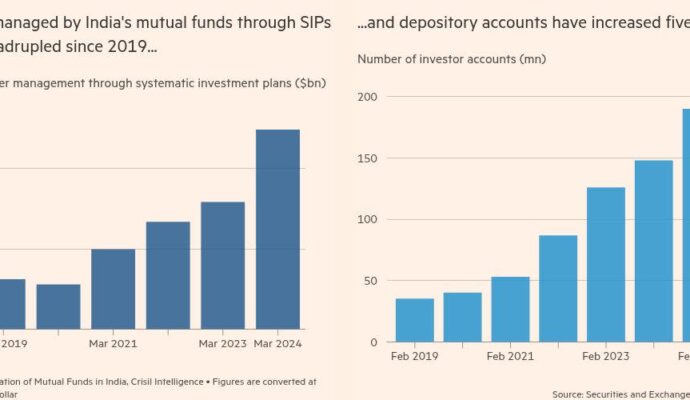
Leaders of the European Union pressed China on the country’s trade imbalance with Europe and its support for Russia during a visit to Beijing on Thursday that highlighted the growing tensions between the two sides.
The meeting, which took place in separate sessions between China’s leaders, President Xi Jinping and Premier Li Qiang, and Charles Michel, the president of the European Council, and Ursula von der Leyen, the president of the European Commission, was the first in-person summit of the leaders of China and the European Union in more than four years.
In her opening remarks, Ms. von der Leyen told Mr. Xi that it was “essential to put an end to the Russian aggression against Ukraine.” She added that there were “clear imbalances and differences” that the two sides must address on trade.
The European leaders urged China to use its influence over Russia to end its war in Ukraine and withdraw its troops. They also pressed China to help prevent Russia from circumventing sanctions.
“We have been clear since the beginning of the war that how China will position itself vis-à-vis the Russian aggression toward Ukraine, this will define also our relationship,” Ms. von der Leyen said in a news conference after the summit.
No issue has frustrated European officials more than Beijing’s refusal to curtail its support for Moscow. China has aided Russia’s war effort by purchasing Russian oil and supplying the Kremlin’s military with microchips, drones and other equipment that is believed to fall just short of arms and ammunition.
Despite the backlash, China is highly unlikely to abandon Russia, calculating that it needs Moscow in the long run, as a partner in countering the United States’ global dominance.
As expected, the summit did not result in any significant breakthroughs. Trust between China and the European Union has been eroded by failed promises to open China’s market wider for European businesses, as well as by Beijing’s crackdown on freedoms in Hong Kong and the northwestern Chinese region of Xinjiang.
China also views Europe as being widely influenced by Beijing’s chief competitor, the United States, and has tried to drive a wedge between the region and Washington. The war in Ukraine, however, has only strengthened the trans-Atlantic alliance as Europe has grown increasingly reliant on Washington for military aid.
The 27-member European bloc has labeled Beijing a “strategic rival” and agreed in June to work toward “de-risking” its supply chains by limiting their dependence on Chinese firms. The European Union has also aligned itself with the United States in adopting restrictions on the trade of high-tech products with China.
And on Thursday, Italian officials speaking on the condition of anonymity confirmed that Italy had told China in recent days that it would no longer participate in its Belt and Road initiative, which aims to expand Beijing’s influence abroad with infrastructure projects.
Those moves underscore the widening rift between the West and China as Mr. Xi has adopted a more assertive foreign policy aimed at reshaping the global order to serve Chinese interests.
According to an official summary from China of Mr. Xi’s meeting with the European leaders, Mr. Xi urged them to bolster cooperation with China to enhance “political mutual trust” and “eliminate all kinds of interference,” a tacit reference to Washington.
China has said that the two sides are not rivals, and that their common interests far outweigh their differences.
But tensions are also rising over the cheaper Chinese electric vehicles, solar panels and wind turbines that have flooded the European market.
The region recorded a $426 billion trade deficit with China last year, its biggest ever. And as China’s economy struggles amid a spiraling housing crisis, the country may seek to ramp up exports as an engine of growth.
“China cannot offer anything to Europe because it is so constrained by its economy,” said Alicia García-Herrero, the chief economist for Asia-Pacific at Natixis, a French investment bank.
In September, the European Union formally started an investigation into whether electric car makers in China have received government subsidies, a move that could result in tariffs. Electric vehicles are an especially sensitive issue because auto manufacturing plays an outsized role in Europe’s economy.
China has dismissed many of Europe’s complaints about the trade imbalance, saying a significant portion of the country’s exports to Europe are from European-owned companies based in China.
The success of China’s industry is a result of early investment and innovation, not subsidies, said Tu Xinquan, dean of the China Institute for WTO Studies at the University of International Business and Economics.
“There is a sense of crisis in the E.U. because the auto industry is crucial for them,” he said.
European businesses also complain of shrinking market access in China because of laws requiring foreign firms to use Chinese suppliers, and have raised concerns about laws on national security.
One agreement to emerge from the summit, the two European presidents agreed, was a mechanism for China to provide more clarity on how European companies can follow stricter rules on transferring data out of the country.
Those rules have already become so stringent that some American companies, taking a cautious stance until the rules are more clearly defined, have banned their employees in mainland China from taking their laptop computers with them on trips out of China.
Gaia Pianigiani contributed reporting.


